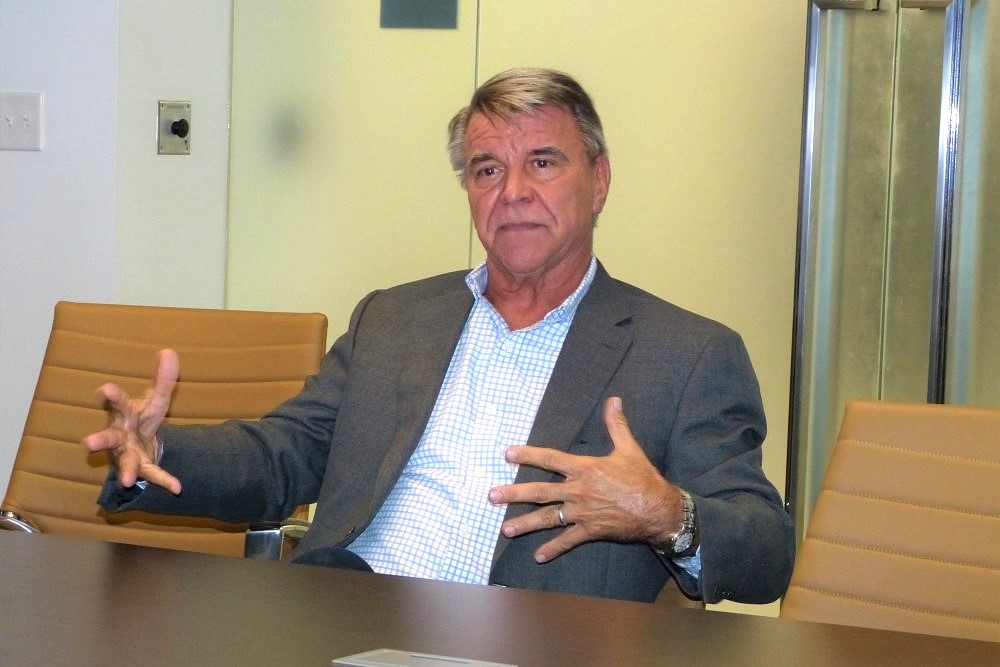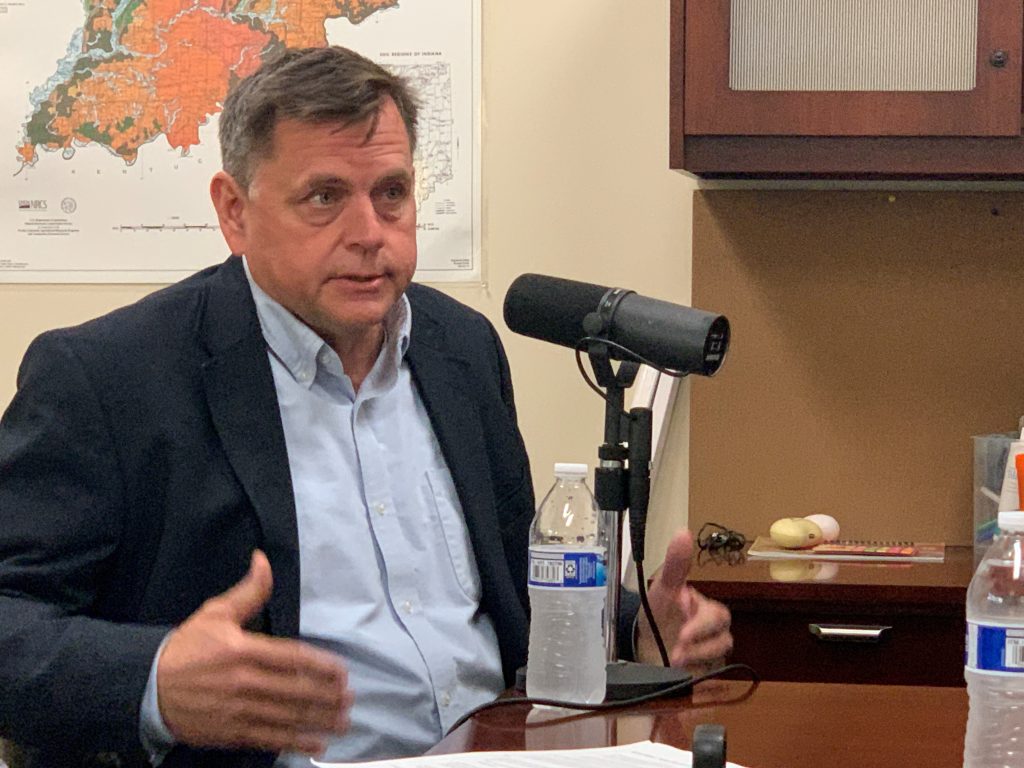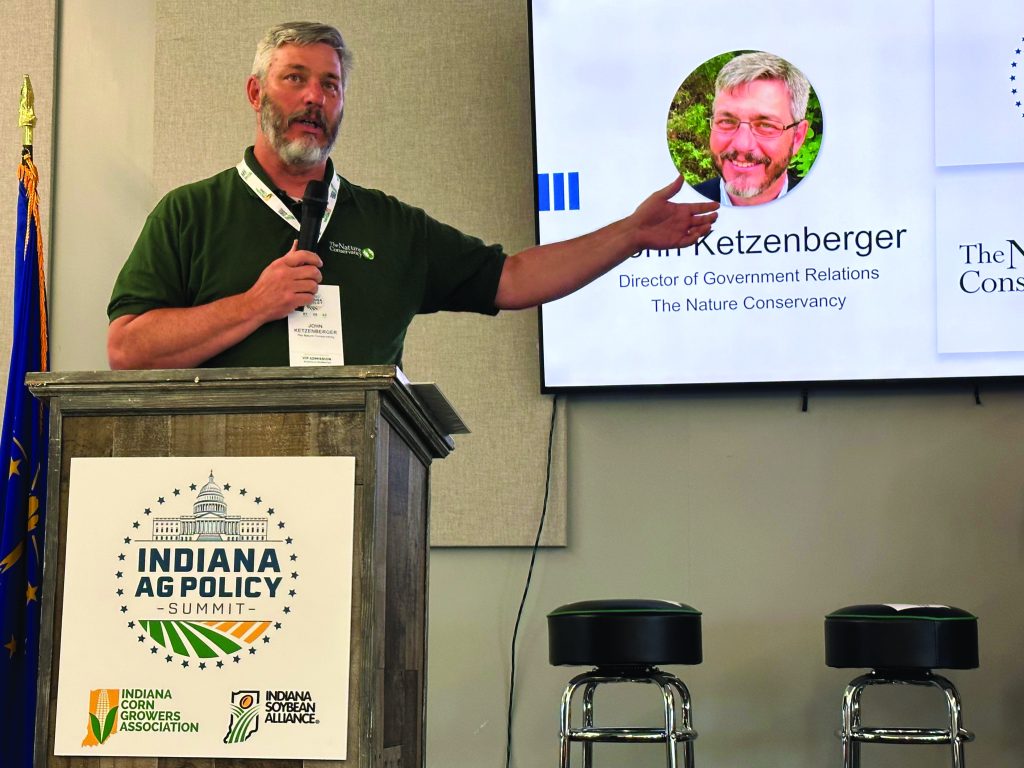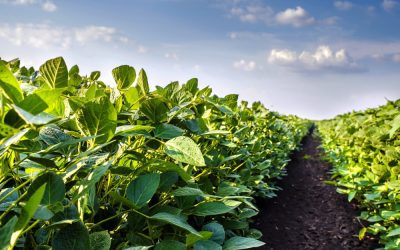For Hoosiers, November election brings a new president, governor and senator
By Dave Blower Jr.
The election results from Indiana show a shift in roles for many Hoosier lawmakers. In the race for the U.S. Senate, U.S. Rep. Jim Banks (R-Dist. 3) is now U.S. Sen.-elect Jim Banks. In the race for governor, U.S. Sen. Mike Braun (R-Ind.) is now Indiana Gov.-elect Mike Braun.
During a recent Ag Policy Podcast produced by Hoosier Ag Today and sponsored by the Indiana Soybean Alliance’s Membership & Policy Committee (M&P) and the Indiana Corn Growers Association (ICGA), the ramifications of the election earlier this month were analyzed by three policy watchers. These analysts included ICGA and M&P Senior Director for Industry Affairs Steve Howell, The Nature Conservancy Director of Government Relations John Ketzenberger and National Council of Farmer Cooperatives CEO and President Chuck Conner.

To listen to this podcast in its entirety, go online to hoosieragtoday.com and click on the link to the Indiana Ag Policy Podcast.
Many of the races were not a surprise. In the national race, President-elect Donald Trump earned 58.6 percent of the vote in Indiana as Vice President Kamala Harris received 39.7 percent. Trump went on to defeat Harris 312-226 in electoral votes.
Gov.-elect Braun defeated Democratic challenger Jennifer McCormick 54.4 percent to 41.1 percent, and Sen.-elect Banks defeated Democrat candidate Valerie McCray 58.6 percent to 38.8 percent.
In the Congressional races, Republicans held on to seven seats and Democrats maintained two seats. The results were:
- District 1 – incumbent U.S. Rep. Frank Mrvan (D) 53.4 percent; Randy Niemeyer (R) 45 percent
- District 2 – incumbent U.S. Rep. Rudy Yakym (R) 62.7 percent; Lori Camp (D) 34.6 percent
- District 3 – Republican Marlin Stutzman 65 percent; Democrat Kiley Adolph 31.4 percent
- District 4 – incumbent U.S. Rep. Jim Baird (R) 64.9 percent; Derrick Holder (D) 30.9 percent
- District 5 – incumbent U.S. Rep. Victoria Spartz (R) 56.6 percent; Deborah Pickett (D) 38 percent
- District 6 – Republican Jefferson Shreve 64 percent; Democrat Cynthia Wirth 31.7 percent
- District 7 – incumbent U.S. Rep. Andre Carson (D) 68.3 percent; John Schmitz (R) 29 percent
- District 8 – Republican Mark Messmer 68 percent; Democrat Erik Hurt 29.4 percent
- District 9 – incumbent U.S. Rep. Erin Houchin (R) 64.5 percent; Timothy Peck (D) 32.7 percent
In the Indiana Statehouse, Republicans will maintain super-majorities in each chamber. Republicans will have a 70-30 advantage in the House of Representatives and a 40-10 advantage in the Senate.
Election analysis
Howell said having established relationships with many of the recently elected officials will help ICGA and M&P as it pushes for farm-friendly policies.

“We do have a lot of new faces,” he said. “We’ve got a new governor, a new senator and three new House members, so there’s a lot to do. But, for as many new faces as we have, I think it’s going to be an easy transition for our organizations because we’ve had relationships with these folks in other positions. We worked with Gov.-elect Braun as a senator. We worked with Sen.-elect Jim Banks in the House, now we’ll work with him in the Senate. I had the opportunity to work with Jefferson Shreve while he was a member of the Indianapolis City-County Council, so I’ve got a little bit of history there. Mark Messmer worked in the Statehouse as a state senator, so we’ve got some history of working with him. I think we will be able to get up to speed with a working relationship pretty quickly with some of these folks.”
Ketzenberger said the newly elected officials will be good for Hoosier conservationists. He said The Nature Conservancy works in tandem with farm groups from around the state.
“I see Rep. Baird, in the House, continuing to play a key role especially as we see what happens or doesn’t happen with the farm bill during the next lame-duck session and going into next year,” he said. “I think Sen.-elect Banks is going to be an interesting person to watch. In the House, he was one of 435. He was pretty aggressive and got around on the issues in a hurry. Now that he’s in the Upper Chamber, as they say, it’ll be interesting to see how he handles that.”
Ketzenberger went on to say that Banks has a good path to follow because U.S. Sen. Braun had a good record when it came to conservation and farm policy.
Conner believes most farmers will be pleased with federal tax policies. “We want to see an extension of our current tax policy, which is pretty favorable policy for estates, for farms, for LLCs, corporations – pretty favorable” he said. “With Trump, and now control of the House and the Senate being Republicans, it’s almost certain that those tax provisions, that all expire next year, are going to get extended. And I think generally, most people would say that’s pretty good news for American agriculture and for agribusiness.”
Conner believes a major win for farmers under Republican leadership relates to regulatory issues.
“My phone rings off the hook every day from people complaining about regulatory overreach, whether that’s Environmental Protection Agency, Department of Labor, it just seems like there’s a constant onslaught,” he explained. “I think you can safely say that when Trump takes office, regulatory overreach is going to stop – period.”
An area of concern that might be more difficult to tackle is farm labor.
“We’ve been working on that for a very, very long time, unsuccessfully,” Conner said. “I think our chances of solving some of those labor problems in a Republican-controlled body gets a little bit more challenging, because it does interact with all of our border-control issues and the like, and that’s just going to be a lot stickier probably with the Republicans in charge than had it been a different set of circumstances.”
Farm bill during lame-duck session?
Conner said he believes Sen. Debbie Stabenow (D-Mich.), who is the chair of the Senate Ag Committee, sees farm policy as her legacy of her work in the Senate. Stabenow did not seek re-election this fall.
“The farm bill, I think, is still a complete unknown at this point,” he said. “We just don’t know what the implications of the election are on the farm bill. I would still like to see Congress get a farm bill done during this lame-duck session. That lame-duck session, just as a reminder, will still have Democrats in charge in the Senate. But I think there is still enough common ground that we can get that done before Trump is inaugurated as the next President of the United States.”
Ketzenberger agreed that the lame-duck session may be the best opportunity to get a farm bill passed.

“I don’t think the Democrats’ opportunity to influence this farm bill gets any better when control of the Senate and this committee flips to the Republicans,” he said. “Any leverage that they want to exercise, and any input they want to add, this is the time for Democrats to make that move.”
At the same time, Ketzenberger said the response by House Republicans to a Senate farm bill proposal is another concern. He added that House Speaker Mike Johnson (R-La. Dist. 4) may not have incentive to move the farm bill forward until after Republicans control both chambers of Congress.
Conner said, “My advice for the speaker is that Rural America came forward for the Republicans in a pretty resounding way in this election. This would be a great way to kick things off – not that the farm bill is the only thing that matters in Rural America – but it’s a very important issue out there.”
He added that getting the farm bill out of the way would allow Republicans to focus on economic issues in the first 100 days of the new term. Conner said the economy is the overwhelming reason why Republicans were voted into office in this election.
Next USDA Secretary
As the Trump Transition Team works to get its cabinet in place for the new year, two Hoosiers have been prominently mentioned as candidates for USDA Secretary: former ISDA Director Ted McKinney and former U.S. Ambassador Kip Tom.
McKinney, who now serves as the CEO of the National Association of State Departments of Agriculture, was the USDA’s Undersecretary for Agricultural Trade during President Trump’s first term. Tom was also a part of the first Trump Administration as the U.S. Ambassador to the United Nation’s Agencies for Food and Agriculture.
“They are both agriculturalists right to their core,” Conner said. “They do a great job in their positions. We are really encouraging the Trump Administration to look for someone who has the heart of a farmer. That’s going to be really critical going forward.”
Other names that are being considered for this post include Texas Ag Commissioner Sid Miller, American Farm Bureau Federation President Zippy Duvall and North Dakota Gov. Doug Burgum.
Posted: November 16, 2024
Category: ICGA, Indiana Corn and Soybean Post - November 2024, ISA M&P, News



